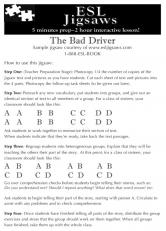ESL Jigsaws
5 Minutes Prep - 2 Hour Interactive Lesson!
Viewing entries tagged with 'intermediate'
Reading on a Thrift Store Business Model
Thrift stores are becoming more popular with middle aged clothes shoppers. Seems if you don't want to wear yoga attire to work, thrift stores are some of the best sources for clothing made from a wider variety of fabrics.
Soft Skills: Small Talk About the Weather
Over the years I've had numerous students say they've been turned down after job interviews because they lacked local experience. If having worked locally were a prerequisite for the job, would their resumés not have precluded them from even getting the interview? More likely the experience referred to is related not to quantifiable hard skills but rather to more intangible soft skills that enable a person to "fit in", such as knowledge of local language and the ability to engage in small talk.
Make Canada Study Come Alive
Making your study of Canada for beginner and intermediate ESL come alive is easy with the use of some supplemental materials, like pictures, video and songs. Over the years I have collected about 15 images per province or territory from free Canada calendars, depicting such things as wheat fields, fishing villages, salmon, Douglas Fir trees and igloos that perfectly illustrate aspects of the jigsaws in Callan’s Beginner Canada Jigsaws or Callan’s Canada Jigsaws. I also like to use the video Destination Canada, found in most tourist shops. I show the section of the video related to a given province or territory, either with the sound off and my own narration for lower levels or with the sound on for higher levels.
Go and Went Grammar Errors
Anyone who has taught grammar in a beginner level ESL or EFL class knows that the speed and accuracy with which students complete grammar worksheets is only very weakly correlated with their ability to use the given grammatical structure later in their own speech.
A Fun Way to Teach Body Parts
Jigsaws aren’t the only cooperative learning activity that I do in my classroom. Here is a fun activity for reviewing body parts. I divide the class into groups of three and give each group a sheet of chart paper and a felt marker. I ask the students to take turns being the artist.
Telephone Voice Mail Messages
Many new immigrants answer the phone in their own language. A Korean immigrant might answer, "Yabusayo?" A Chinese immigrant might answer, "Wei?" Often their thinking is that most people who call them speak their language anyway and those who don't will understand that they are simply answering in their own language.
Soft Skill: Who Picks Up the Bill?
We often think of bargaining language as confined to situations like a garage sale or to the purchase of larger items like cars or homes. One of the most common negotiations most people will engage in at some point is who will pay the bill in a restaurant. Not only are there language and soft skills specific to this situation, many cultural assumptions are thrown into the mix. Countries, as well as the cultures within them, differ in their norms about who should pick up the tab and when. Learning the related idioms and other bargaining language but not cracking this cultural code and developing the soft skills to successfully navigate this interaction can lead to social awkwardness as exemplified in the story below.
Environmental Jigsaw for Higher Levels
When choosing a jigsaw that is appropriate for the level of your class, it’s important to remember that jigsaws are not passive reading exercises. These four skills lessons require the students to not only read their part, but to teach it to their classmates. Pronunciation and listening skills are key.
Collective Nouns for Animals for Intermediate Level
I've taken a moment to make a test of English for you, the ESL or EFL teacher, for fun! Let's see how well you do! Simply choose the correct collective noun.
Charter of Rights and Freedoms
Discussion of the Canadian Charter of Rights and Freedoms can make for an interesting lesson in an intermediate ESL class. Students often assume freedom of expression is the right to say anything about any person or about the government. Here’s where you can let them know about libel laws and Canada’s Hate Speech Laws. Unlike the United States, the Criminal Code of Canada prevents “hate propaganda”. Is this a good thing? Why do we have those laws?


